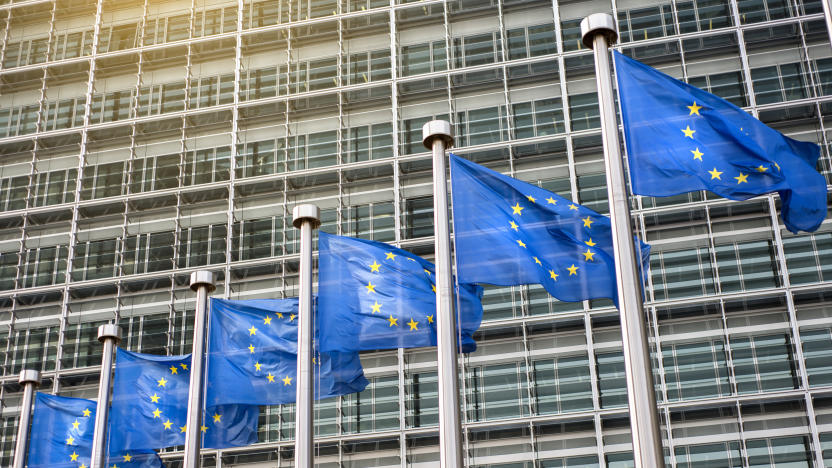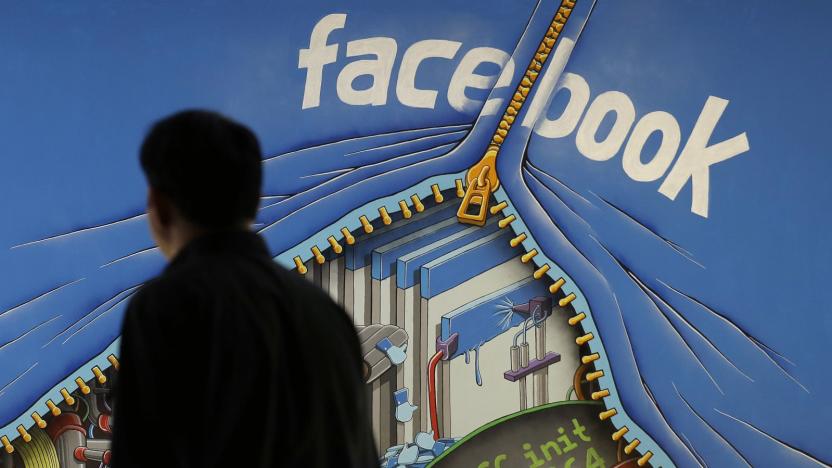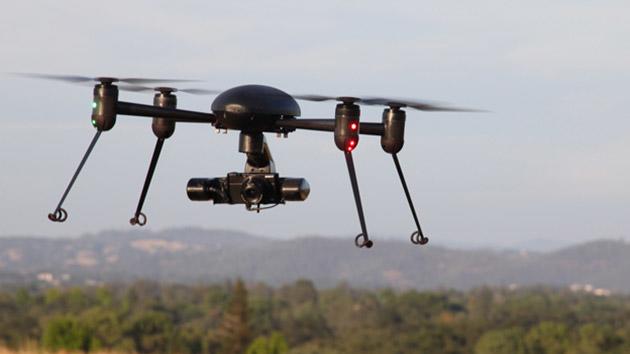proposal
Latest

New SEC rules would require companies to disclose climate goals and emissions
Public companies would be required to disclose greenhouse gas emissions they produce under new rules proposed by the US Securities and Exchange Commission.

CD Projekt Red will pay only $1.85 million to settle 'Cyberpunk 2077' lawsuit
Developer CD Projekt has reportedly agreed to pay $1,850,000 to settle an investor lawsuit over the buggy launch of Cyberpunk 2077.

The EU could break up big tech companies that violate stricter rules
The UK is also planning to clamp down on harmful content on social media.

SEC proposal could turn gig workers into stockholders
The Securities and Exchange Commission has proposed a set of rule changes that would give internet platforms like Uber the option to give gig workers equity as part of their compensation. As Axios noted, companies like Uber and Airbnb have been asking the SEC to modify its rules so that they can give company stock to their drivers and contractors for quite a while now. Under the proposed changes to Rule 701, a five-year pilot program would allow internet platforms to issue equity to their workers, so long as it’s no more than 15 percent of the value of their compensation within a 12-month period.

NASA ramps up its efforts to understand space weather
This week, NASA selected three proposals for missions that could help us better understand the Sun-driven space weather that occurs near Earth. Space weather, like solar flares, can impact spacecraft and astronauts, and it has the potential to disable utility grids on the ground. As NASA prepares to send more astronauts to space and we become increasingly reliant on technology, the need to protect both has become more pressing.

Recommended Reading: Facebook moderator PTSD
Bodies in seats Casey Newton, The Verge The job of moderating toxic content on social media is a daunting task. It also takes a massive psychological toll on those doing it. The Verge has first-hand accounts from the worst-performing Facebook moderating site in North America. People who worked there describe dire working conditions, harassment and their struggles with PTSD.

Yahoo could pay $117.5 million to settle data breach
Yahoo is back in the courtroom with a revised settlement proposal meant to make amends for its massive data breaches. If this proposal is approved, the company will pay $117.5 million.

Facebook drafts charter for content oversight board, but questions remain
Mark Zuckerberg talked about creating an independent body that would oversee Facebook's content decisions, and now that plan is taking shape. The social site has published a draft charter for an oversight board that would handle appeals for content decisions. There are still many unknowns, but it gives you an idea of the focus and scale for the new organization when it's ready.

Sidewalk Labs reveals site plan for smart neighborhood in Toronto
Sidewalk Labs' smart neighborhood in Toronto is edging closer to becoming a reality after it revealed the initial draft plan for the site. It's proposing that Quayside should be focused around 12 mass-timber buildings, with a maximum height of 30 stories and a mix of residential, retail and commercial spaces in each.

Dyson's EV ambitions include 10 miles of test tracks
Dyson is most definitely serious about its plans to release an electric vehicle. The company has outlined its proposed second growth phase for its EV development facility at Hullavington Airfield, and the plans are more than a little ambitious. Its application would create more than 10 miles of test tracks around the former base, including specialized tracks for hill and off-roading tests. You'd also see more than 480,000 square feet of new new development space with room for 2,000-plus workers.

Warner Bros. wants to build a sky tram to the Hollywood sign
Finding your way to the Hollywood sign in Los Angeles typically involves a lot of back-street driving. As the iconic sign continues to get visitors, however, the congestion on those residential roads increases, as well. Warner Bros. has a proposal for the city of LA that it claims will help alleviate all that: a tram that connects the Warner Bros. studio lots in Burbank to the famous landmark, along with a visitor center near the sign.

California may soon allow passengers in driverless cars
In early April, California's new rules that allow automakers, tech giants and just about anybody to test fully driverless cars on its roads finally took effect. But before those companies can realize their ride-hailing robot taxi ambitions, they have to wait for the state to adopt a proposal issued by the California Public Utilities Commission. The public utility regulator's proposed rules would allow autonomous vehicles to give rides to the public as part of a pilot program -- that is, so long as their creators meet a few conditions.

You have 30 more days to tell Ajit Pai not to neuter broadband
While it's attacking net neutrality, the Federal Communications Commission (FCC) is pushing a second proposal that could also limit internet freedom. Under Tom Wheeler, broadband was redefined to mean 25Mbps download and 3Mbps upload speeds, but Pai's FCC wants to change that to include mobile networks with meager 10Mbps/1Mbps speeds. That hasn't been as well-publicized as the Title II issue, so many folks aren't aware that the comment period expires tomorrow. After a letter from 12 Democrat Senators urging an extension, however, the FCC agreed to prolong it by 30 days.

US proposes a phone 'driver mode' to reduce in-car distractions
Smartphones already have car-optimized interfaces like Android Auto and Apple CarPlay, and you'll occasionally see safety measures that shut off features (and enable others) while you're driving. However, the National Highway Traffic Safety Administration wants to do better. It's proposing voluntary guidelines that would both encourage phone makers to both include pairing with infotainment systems (much like Android Auto and CarPlay) and, crucially, a "driving mode" that cuts back on distractions. It would have a simpler interface that minimizes the time you spend looking away from the road, and either disables or downplays features that you don't need while on the move.

Proposed commercial drone rules would ban robotic couriers
If you were worried that the Federal Aviation Administration would require a pilot's license before you could fly a drone for professional reasons, you can relax... well, sort of. The FAA has published its proposed commercial drone rules, and they're a bit more lenient than some had feared. The good news? You wouldn't need a license to fly any drone under 55 pounds; instead, you'd take an "aeronautical knowledge" (read: airspace rules) test every two years and get an operator certificate. And if you're flying model airplanes that fit existing criteria, you'd only be bound by current laws.

Speedrunners get engaged on Awesome Games Done Quick
They met on Twitch, so getting engaged on Twitch is wonderfully romantic. While blasting through a cutscene in the Nintendo 64 game Mischief Makers, Awesome Games Done Quick speedrunner Jackafur took a moment to thank his friends for their support over the years, and then he turned his attention to Kittyrawr, his girlfriend seated right next to him. He said he would love her forever, pulled out a ring, got on one knee and popped the question – and she said yes, all live on Twitch. Onions, guys. Onions. Awesome Games Done Quick has so far raised more than $500,000 for the Prevent Cancer Foundation, and last year the group raised more than $1 million for Prevent Cancer. They're streaming through January 10 – watch it live right here. [Image: Awesome Games Done Quick]

The FCC will vote on net neutrality on February 26th
The FCC may be about to redefine American internet access in a big, big way. Chairman Tom Wheeler has narrowed down the Commission's vote on new net neutrality rules to its next meeting, on February 26th. It's still not apparent exactly what those proposed regulations will be, although they're likely to bridge the gap between the President's desire to treat the internet as a utility and the anti-regulatory approach of internet providers. There's a common ground between the FCC and the President, Wheeler says -- they both want to prevent networks from blocking or throttling apps, and they both value transparency.

Mozilla asks the FCC to rethink net neutrality with content providers in mind
Like some, Mozilla is concerned that the FCC's second take on net neutrality won't be enough to guarantee that internet service providers (ISPs) treat all content fairly. To that end, the Firefox developer has just given the FCC a solution of its own: regulate the relationship between ISPs and "remote delivery services" like Dropbox and Netflix. If these content hosts were subject to the same common carrier rules as phone lines, Mozilla argues, ISPs wouldn't be allowed to discriminate against incoming services by blocking them or slowing them down.

NASA is looking for an alternative to battery power for its spacecraft
NASA knows that conventional battery power won't cut it at a certain point, especially when the agency's vehicles travel into deep space. To that end, it's asking both public institutions and companies to submit proposals for battery alternatives. The initiative will tackle both low-level energy cell design, such as chemistry and packaging, as well as advanced devices that could outperform existing lithium cells. Ideally, NASA will get energy storage that provides more power without taking a hit to either longevity or safety. [Image credit: NASA]

US to reduce its oversight of a key internet governor, but don't expect big changes
The US government has been gradually reducing its influence over the internet ever since it offloaded domain management responsibilities to ICANN back in the late 1990s, and today it took an important (if mostly symbolic) step toward severing those connections for good. The Department of Commerce has asked ICANN to work on a transition plan that will end American monitoring of the firm, letting it run independently. The only major stipulations are that the resulting system is free of government control, maintains cooperative governance and fosters an open internet. The transition was always going to be in the cards at some point, but the proposal request is a gesture toward an international community worried that a surveillance-happy US has too much say over what happens online. Don't be too quick to celebrate, though. A big policy change is unlikely, at least in the short term -- the Commerce Department has only had limited practical control. Also, ICANN itself only has so much reach. While it does watch over domain names and network addresses, it can't completely block sites or open them up to spies. At the moment, the shift is more about fulfilling promises and reassuring global partners than anything else.







